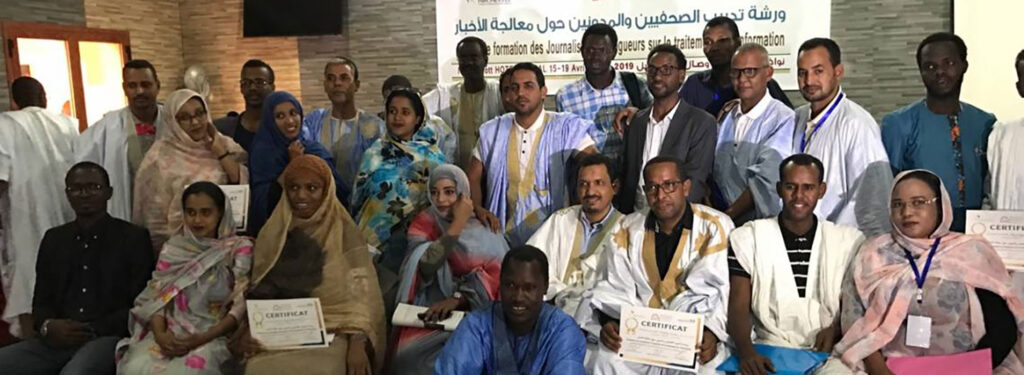
Journalist training: Fondation Hirondelle led a training session on the ethical and professional foundations of journalism from 15th–19th April in Nouakchott, to identify and counter fake news spread through social media. The participants included 30 journalists from different communities in the country working in audiovisual, print and web media.
The first round of Mauritania’s presidential elections took place on the 22nd of June, 2019 in a climate of social, political and economic tension overlaid with ethnic and religious suspicion. According to Reporters Without Borders, Mauritania has experienced a sharp decline in press freedom since 2014, although the country had made progress in this area in previous years. Its media community is poorly developed, poorly qualified and largely composed of bloggers with no professional training.
In partnership with the Cordoba Peace Institute of Geneva (which aims to promote exchanges between the cultures and civilizations of various communities), Fondation Hirondelle held a media training course for 30 Mauritanian journalists and bloggers.
Michel Beuret, former Editorial Manager at Fondation Hirondelle, led this Netherlands-funded workshop in Nouakchott in April 2020.
The training put the focus on inclusivity, with 30 male and female journalists from all branches of the media (public and private, radio, TV, press and internet) reflecting the country’s diverse population: Bidhan, Haratin, and people of Soninké, Fulani and Wolof descent, among others.
The 30 participants were individually selected through a preliminary project that carried out around 60 interviews in January 2019.
The Nouakchott training focused on working with sources and on editorial responsibility and ethics for journalists. Several practical exercises addressed fake news in the age of social media, the risk of spreading it and the professional way to avoid or counter it.
As some participants spoke only Arabic and others only French (or a vernacular language), the workshop provided continuous simultaneous interpretation.
Participants felt that this interpretation service offered the side benefit of allowing them to get to know each other better and also to take an active role.
According to Habib Sal of Radio Publique Mauritanienne, “We really learned a lot through this training (…). We often used to do workshops. People would participate the first day, and then the room would be empty until the last day, when they’d return to pick up their certificates. But this time, people stayed for the 5 days. This shows the importance of this workshop and people’s interest in it. It was incredible (…). After this workshop, I think we’re better equipped, and we have more reasons to work as journalists.“
See a testimonial from a journalist participating in the workshop:


